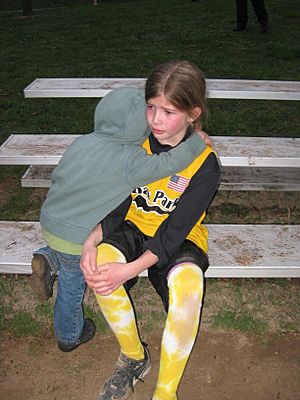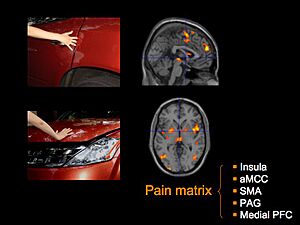Empathy facts for kids
Empathy is when you can understand and share the emotions and feelings of another person. It's like putting yourself in someone else's shoes to see how they feel. This word was first used in 1909 by an English psychologist named Edward.B. Titchener.
Contents
What is Empathy?
Empathy is often described as being able to understand, feel, and respond to what another person is experiencing. It means you can imagine things from their point of view.
The word "empathy" comes from the Ancient Greek word "empatheia." This meant "physical affection or passion." Later, in 1903, a psychologist named Theodor Lipps used the German word "Einfühlung," meaning "feeling into." Edward B. Titchener then translated this into English as "empathy" in 1909.
Since then, "empathy" has had many meanings. It can mean caring for others and wanting to help them. It also means feeling emotions that are similar to someone else's. Empathy helps you understand what another person is thinking or feeling.
When you show empathy, you accurately understand someone's actions and feelings. You communicate this understanding in a way that makes sense to them. This helps us understand complex human feelings and how people interact.
Our ability to recognize feelings in others is linked to how we imitate them. It seems we naturally connect the body movements and facial expressions we see with how we would feel if we made those same movements.
Empathy and Similar Feelings
Some words are often used with empathy, like compassion and sympathy.
Compassion
You feel compassion when you notice others are in need. This feeling makes you want to help them. Like empathy, compassion has many different meanings.
Sympathy
Sympathy is a feeling of care and understanding for someone who is having a hard time. It can also include wanting to see them feel better or happier.
Pity and Emotional Contagion
You feel pity when you feel "sorry" for someone who is in trouble or needs help. Emotional contagion is when you start to feel the same emotions as others around you, sometimes without even realizing it.
How Empathy Grows
Children start to show basic signs of empathy around age two. They might have an emotional response that matches another person's feelings. Even at one year old, babies begin to understand that other people's actions have goals, just like their own. Toddlers sometimes comfort others or show they are concerned.
Children between seven and twelve years old show brain activity similar to if they were hurt themselves when they see others get injured.
Most children fully develop a "theory of mind" around age four. This means they can understand that other people might have different beliefs than their own. This is an important step for empathy.
What Affects Empathy?
Several things can influence how much empathy a person has.
- Individual Differences: Some people are naturally more empathetic than others.
- Sex Differences: On average, girls and women often score higher than boys and men on empathy tests.
- Environmental Influences: Things like how parents raise their children and the relationships they have can affect how empathy develops.
Empathy in Animals
Studies of animal behavior and their brains show that empathy is not just for humans. Scientists have seen empathy-like behaviors in animals like bonobos (a type of ape) and even in rodents.
The Brain Science of Empathy
Neuroscience helps us understand how our brain processes and understands emotions. Studies on "mirror neurons" try to explain how we can understand what others are thinking and feeling, which is key to empathy. People who score high on empathy tests often have very active mirror neuron systems.
Empathy has two main parts:
- Cognitive empathy: This is about understanding or recognizing the emotions another person is feeling.
- Affective empathy: This is when you actually feel or share those emotions yourself.
When Empathy is Impaired
Sometimes, a person's ability to feel empathy can be affected. This can happen in certain conditions, such as:
- Psychopathy: This condition involves antisocial behaviors and a lack of empathy.
- Autism: This condition can affect social communication skills and how a person shows empathy.
Why Empathy Matters
Empathy is a very important quality in society. It often encourages people to act kindly and help others without expecting anything in return. On the other hand, a lack of empathy can be linked to antisocial behavior.
Empathy helps us understand what others might do and why. It also helps us build good relationships with people. Empathy is also very helpful in solving disagreements. It helps people understand each other's viewpoints, prevents misunderstandings, and reduces unfair judgments.
Examples
Imagine your friend, Alex, studied incredibly hard for a big science test, spending hours reviewing notes and practicing problems. When the results come back, Alex didn't do as well as they hoped, and you can see the disappointment on their face.
Empathetic Response: Instead of saying, "It's just one test, don't worry about it," which might make Alex feel like their feelings are being dismissed, an empathetic response would be, "I know how much effort you put into that test, Alex, and it's totally okay to feel disappointed. You worked really hard. What can I do to help you feel better, or maybe study for the next one?"
Fact: Studies show that even small acts of kindness and understanding, often driven by empathy, can significantly boost both the giver's and receiver's mood, creating a positive ripple effect.
Imagine another situation. A new student, Maya, joins your class mid-year. On her first day, she looks a bit lost, sitting alone during lunch and seeming shy about asking questions. You remember what it felt like to be new in a different situation, maybe at a new school or camp.
Empathetic Response: You might walk over to Maya, introduce yourself, and offer to show her around the school, explain how things work, or invite her to sit with your group at lunch. You understand that starting somewhere new can be overwhelming and lonely.
Figure: Research suggests that feeling included and supported can improve a student's academic performance by up to 15% and significantly reduce feelings of anxiety.
See also
 In Spanish: Empatía para niños
In Spanish: Empatía para niños
 | Laphonza Butler |
 | Daisy Bates |
 | Elizabeth Piper Ensley |




